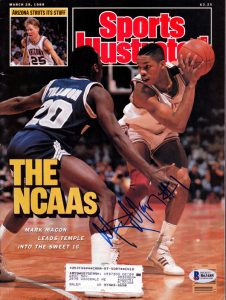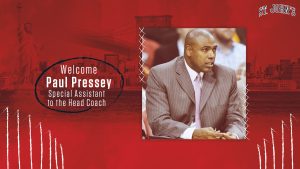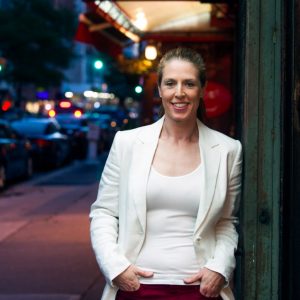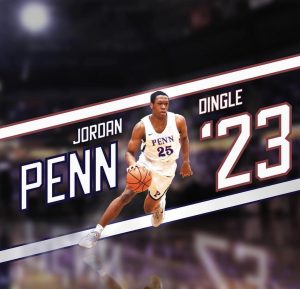CLICK HERE for all of our extensive Preseason Content
We continue our season preview coverage with Temple Assistant to the Head Coach Mark Macon. Macon showed up in North Philly in the late 1980s and started rewriting the Owl recordbook: 2609 career PTS (#1 in school history), 281 STL (#2 in school history), a #1 ranking in the 1988 AP poll, national Freshman of the Year, and the only 4-time 1st-team All-Conference player in A-10 history. After playing 6 years in the NBA, he later returned to campus as an assistant to Hall of Fame coach John Chaney, and now he is back on the sideline with fellow former A-10 POY/new Temple head coach Aaron McKie. HoopsHD’s Jon Teitel got to chat with Mark about being a great scorer and working for Coach Chaney.
In the 1985 Michigan High School Class B state title game Roy Marble scored 25 PTS and his Flint Beecher team made a 15-foot jumper at the buzzer for a 2-PT 2-OT win over your Buena Vista High School team to finish the year with a perfect 27-0 record: how devastating was it to come so close to winning it all and fall just short? It was devastating to lose after working so hard to get there, but at the time it was considered 1 of the best games in state history. I loved Roy as a person: he was a great athlete and a great person. Our goal was not just to get there but to win it all.
Take me through the 1986 state tourney:
You scored 46 PTS against Gladstone in the quarterfinals (the 6th-most PTS in Michigan state tourney history): was it just 1 of those situations where every shot you put up seemed to go in because you were “in the zone”? No: that came from hours and hours of hard work and practice. I was confident in myself and my teammates were confident in me as well so we believed that we could win and were never afraid to do whatever we had to do. If someone could not do the job then someone else would step up.
After Beecher’s Ernest Stewart made a FT with 3 seconds left, Chris Coles made a 54-footer at the buzzer for his only PTS of the game in a 1-PT win in the state title game: where does that rank among the most amazing shots you have ever seen? It definitely ranks right at the top that I have seen in person. I had total confidence that something good was going to happen…and it did. There was a miracle-like energy in the building.
In 1987 after graduating with 2490 PTS you were named Michigan Mr. Basketball (ahead of future pros like Anderson Hunt/Steve Smith) and Athlete of the Decade by the Saginaw News: do you consider yourself to be 1 of the best players in state history? That is up to the opinion of others but I knew that I was just as good as anyone else in our state. Growing up in my era there were a lot of great players but I rode on the shoulders of players like Kermit Washington and Tony Smith and many others. There was always good competition in the area who made sure that you would have a tough time playing pickup ball. Even when I was in the 5th grade I looked up to guys who showed me that small guys could succeed. I played against guys like Terry Mills/Glen Rice and those battles helped make me who I was. Every team you played against had several guys who went on to play in D-1. My 2 brothers were also important in everything I did as a basketball player because I had to get on their shoulders 1st.
That same year you were named MVP of the McDonald’s All-American Game after scoring 14 PTS in an 8-PT win by the East: which of your fellow players impressed you the most (Larry Johnson, Marcus Liberty, Dennis Scott, other)? I had played against Marcus and he could do everything. I also knew what the others could do. LaBradford Smith and Rodney Monroe were fellow 2-guards like me so I was excited to compete against them. Brian Shorter was a monster and was the best player there, bar none. Elliott Perry was my roommate so I will never forget him.
In 1988 at Temple you scored 20.6 PPG and were named national Freshman of the Year: how were you able to come in and be so successful right from the start? Training. I spent countless hours training myself to be prepared defensively, which we ran during my final year of high school. I knew how to cut and handle the basketball so I just had to be ready mentally to play. The coaches put me in a position to come in and do things right away.
In 1989 you scored 14 PTS and set a school record with 11 STL in a 4-PT loss at Notre Dame: what is the secret to being a great defender? Anticipation. I always loved playing defense but you have to know what you are looking for. You have to read a guy so that you know what he can and cannot do. You have to run lanes and go behind guys. It was great to get all of those steals but it did not help because we ended up losing the game. My family got a chance to come down from Michigan to see me in South Bend.
Take me through the 1991 NCAA tourney:
You scored 26 PTS in a 9-PT OT win over Oklahoma State: did you feel any redemption by leading your team to victory at the Meadowlands (the location of your 1988 NCAA tourney loss to Duke)? I do not think that it was about redemption: we were just trying to win games because the more we played the better we got. We knew how to play as a group so after I fouled out of that game it was up to my teammates to win it. They were able to close the deal because they trusted each other: it was an awesome game against a heck of a team.
You scored 31 PTS but missed a 25-footer at the buzzer in a 3-PT loss to #1-seed UNC: did you think the shot was going in, and were you surprised to be named East Regional MVP in a losing effort? I thought that every shot I took was going in due to my focus and confidence. Had that shot went in there was no way they were going to beat us in OT. Being named MVP meant nothing to me because it did not help us get to the Final 4. It was heartbreaking to see teammates like Donald Hodge on the ground crying because they wanted to get there so bad. We had to fight just to get into the tourney and I tried to do everything in my power to get us to the Final 4.
You were a 3-time All-American, 1991 conference POY, and the only 4-time 1st-team All-Conference selection in A-10 history: what did it mean to you to win such outstanding honors? That was all great but I do not make a big deal about it. I think the 4-time 1st-team selection is an awesome thing but I just wanted to win as many conference titles as I could. To look back at it now, it is a heck of an honor and I am very proud of that.
You remain the all-time leading scorer in school history: did you realize at the time how prolific a player you were, and do you think that anyone will ever break your record? Not really: I just knew that I was going to bust it open because I almost broke the record as a sophomore! I was not trying to turn pro until I finished school: that was my goal. I love having the record but I really hope that someone will stay in school for 4 years and eventually break it. Books and ball were the 2 most important things in my life: everything else came after that.
In 1992 you averaged 2 SPG (10th-best in the league) for Denver and were named to the All-Rookie team: how were you able to make such a smooth transition from college to the NBA? Same thing: training. I also had the mentality to want to be great. I was so intense that my teammates told me to laugh and smile a little more, which I did…until I hit the floor. As a pro athlete the key is mental training: when you are at a level where everyone can do what you can do physically you need a mental edge. Even if I could not stop someone I would try to make it as hard as hell for them to score.
You were an assistant at your alma mater under Coach John Chaney from 2003-2006: what made him such a great coach, and what was the most important thing that you ever learned from him? He taught me to take care of the small things so that they would not become big things: do not turn the ball over! I had to learn how to teach young men how to play the game even if they did not have the same amount of talent and intensity that I had. I learned that Coach Chaney was just as hard on his newer players as he was on us back in the day. He was more of a teacher when I worked for him: the players were more athletic but not all the young men today are as cerebral as we were back in the day.
You previously spent a few years as head coach at Binghamton: how did you like being a head coach? I was not prepared to be a head coach but I loved it. I was becoming a good administrator and a better coach. I had a 5-year plan when I arrived in Binghamton but it turned into a 2½ year plan. I think that I have a lot to offer if someone is willing to take a chance on me. I believe in loyalty to your players and assistants.







